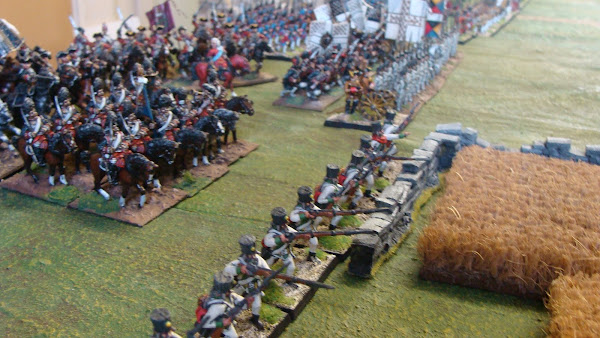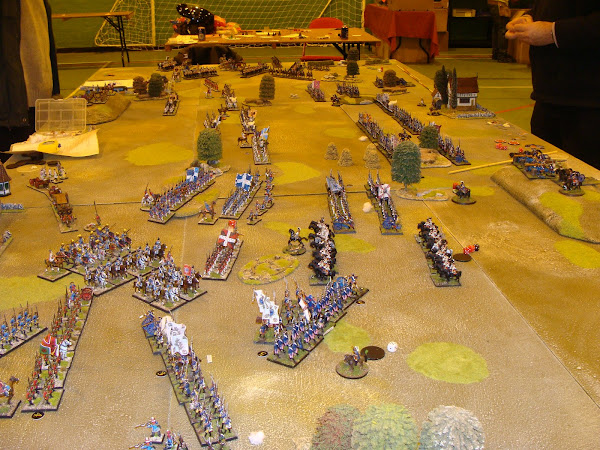Charles Grant Snr. has always been my inspiration regarding wargaming. My well thumbed copy of the magnificent The Wargame is still my go to book whenever I need a wargaming pick me up. However a few years ago I came across a book Grant had written that I hadnt read or owned. Ancient Battles for Wargamers was a great discovery and I still cant understand how I missed it the first time around.
The book contains various ancient battles described and then fought by Charles Grant in his wonderful style, factual, informative and readily usable, something sadly missing from the many so called articles in the wargaming press. Anyway I have never fought the famous Battle of Marathon and thought it would be a great game to fight using the Sword and Spear rules.
Marathon isnt a large battle and can be placed on a small wargames table easily.The important thing for me was to stage a battle that would be tense and not the walkover for the Greeks that is sometimes described in modern interpretations, especially the infamous 300 where they slaughter effeminate Persians in ridiculous outfits? One didnt rule a massive empire by possessing an army filled with effete soldiers.
In September 490 BC the Persians landed in mainland Greece at a suitable bay 25miles from Athens, their target for destruction. The Persians contained an Athenian exile called Hippias who was the leader of Athenian dissidents hidden inside Athens and ready to open the city gates for the Persians. The choice of landing was Hippias choice and allowed 600 Persian ships to land in the bay and allow the Persian army of 25,000 to encamp there.
Marathon bay was perfect for the feared Persian cavalry with long stretches of flat land suitable for the cavalry. Determined to keep the invaders from the city Militades convinced the Athenians to march their entire army to face the Persians at Marathon.
The Athenian army encompassed the 10 tribes of citizen hoplites supported by their allies, the small city of Platea who also provided hoplites. Grant argued that this army would be supported by camp followers who could be utilised as light infantry, and who was I to argue with his ideas. He estimated the Athenian army at approximately 11,000 men.
The Persians originally were estimated at 25,000 but on the day of the battle they were in the process of loading their army back onto the ships with the intention of leaving the Athenians stuck at Marathon whilst they sailed to Athens and victory.
Realising that the Persians were in the process of leaving, the Athenians decided to attack in the hope of defeating them before they were able to sail to Athens.Grant estimated the strength of the Persian's at 15,000 infantry and allowed them a maximum of 1000 light horse who were in the process of riding back to the ships. The vast majority of the Persian infantry were bow armed soldiers famed for their skill with the bow but lightly armoured.
The Sword and Spear ancient rules are a well thought out set that certainly for me captures the feel of ancient warfare without the need for pages of weapon types and armour.
I opted for the following regarding the respective armies 13 bases of hoplites, to represent the 10 Athenian tribes and their allies. I also allowed them 2 bases of peltasts and the obligatory camp, which in the rules allows the player to provide units with multiple order dice which means they gain bonuses. Thus the Athenians had 16 command dice to place in the order bag.
The Persians were a more varied army and contained a mixture of 9 Sparabara units, that is bowmen with pavisse type protection, 4 allied foot with spear and shield, 4 light infantry bases, 3 Ionian hoplites who were given a poor command rating and 4 light cavalry which were off table to start with. Thus the Persians had 24 dice, but no camp which stopped the Persian player from placing more than one command dice with a unit.
Both armies were given a command rating of 4, except for the Ionian hoplites who were given a 5 rating.The Athenians however were heavily armoured and able to form shield walls which makes them very effective in a melee.
In the actual battle the Athenians deployed in an unusual formation, thinning their centre whilst reinforcing their flanks but also stretching their line from the sea to difficult ground in an effort to stop any cavalry riding around their flanks. Militades gambled on the Persians placing their best troops in the centre of their line with their unenthusiastic allies on the flanks. He gambled correctly.
John and I deployed as we wanted, but strangely ended up virtually deploying as in history. It was the most sensible deployment so why change it.
I had to roll for the light cavalry to determine when they would arrive, I managed to roll a four, which was pretty good for me, in reality it was to prove a little to late. In the first tentative moves John struggled to get his hoplites moving in concert, whilst I did manage to throw my lights to the flanks and begin to start peppering the Greeks with arrows and javelins, unfortunately the hoplites are very well protected.
My luck didnt hold for long and the Greeks began to gather momentum and press towards my centre under a hail of arrows that did minimal damage. By move four my cavalry had appeared in dribs and drabs and I attempted to get around the Greeks right flank as quickly as possible.
By move six my sparabara were fighting for their lives. Unexpectedly I threw some decent melee dice that halted the Greek hoplites from piling through the centre. I also discovered that my medium infantry could do a decent job of halting the armoured clowns.
I knew it couldnt last and after eight moves the Persians began to disappear,like snow in Spring.
On move ten the Persians had exceeded their demoralisation score and the line collapsed.An Athenian victory. I think John lost one base of hoplites due to a combination of cavalry charging their rear and medium infantry sacrificing themselves. All in all a devastating victory as per history, but I felt the Persians had acquitted themselves well and if I had been able to slow the Greek advance down my Sparabara would have claimed more hoplites. as it was they couldnt. But it was a very enjoyable game and the rules added to the enjoyment.
My Ionian allies? actually fought well before collapsing.


















































